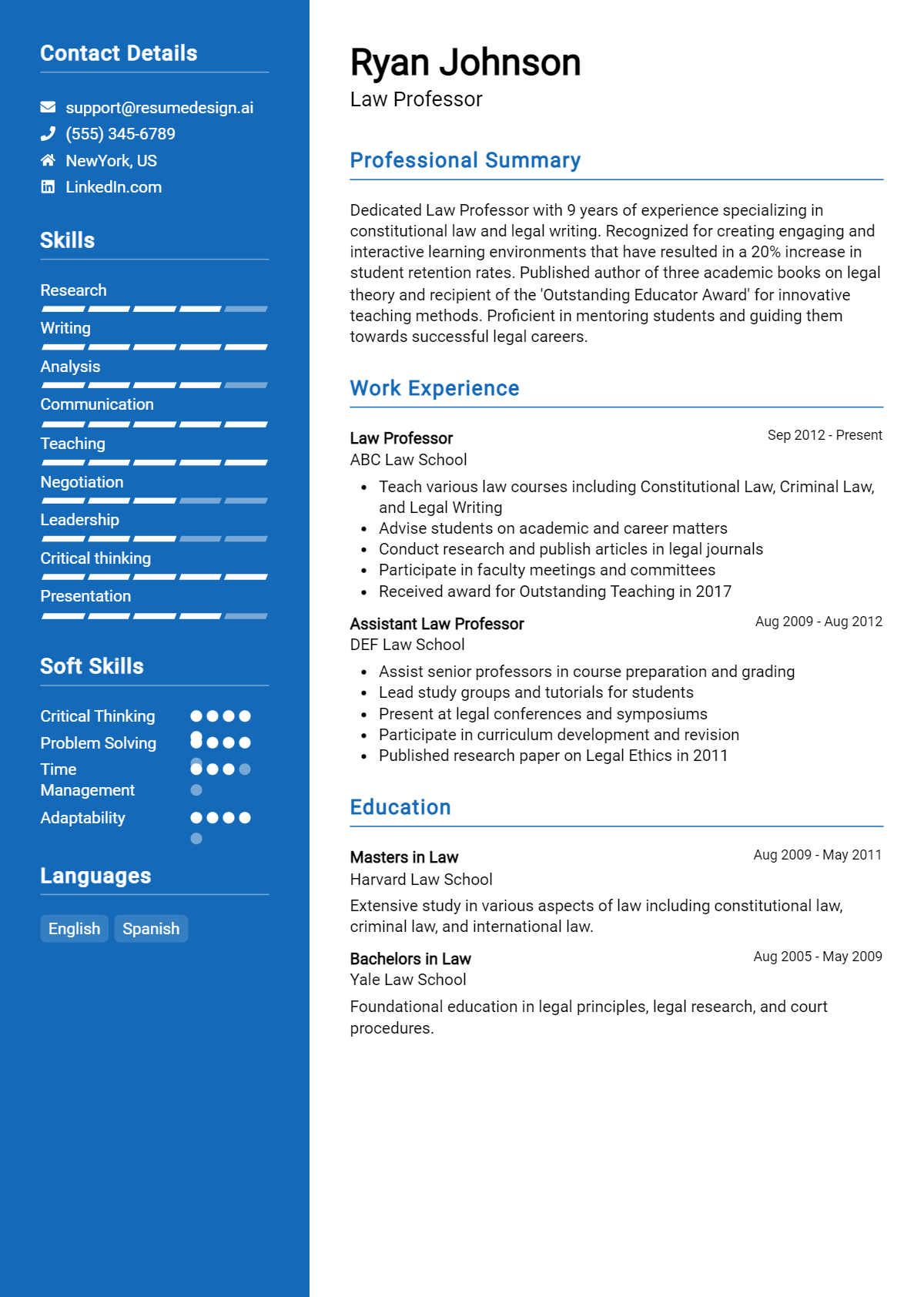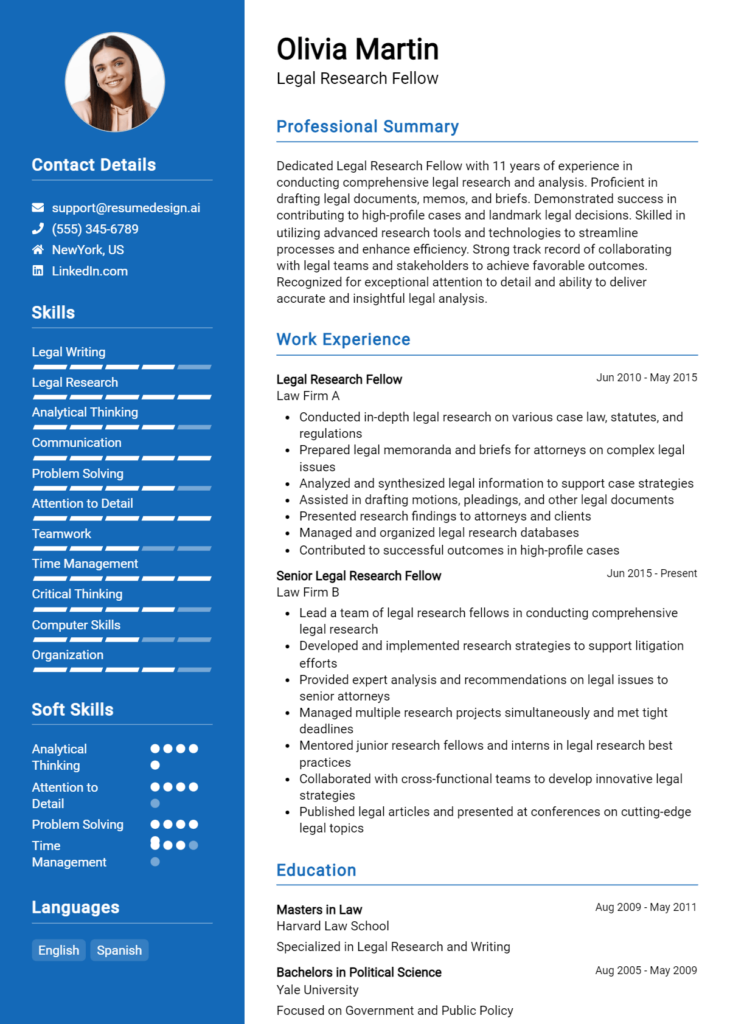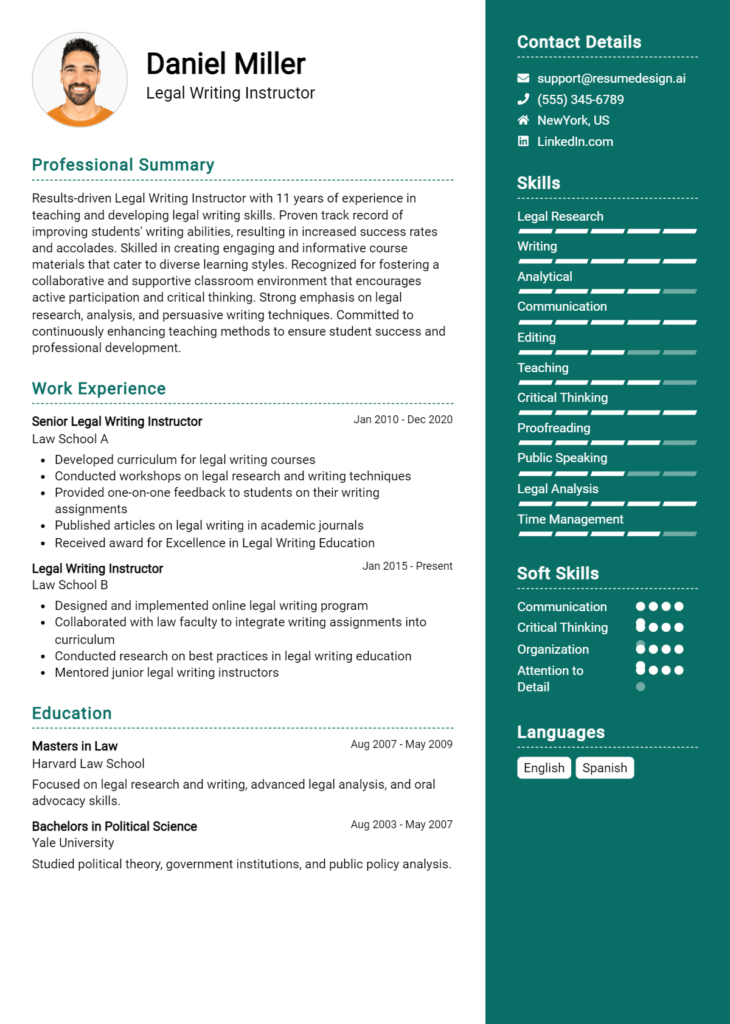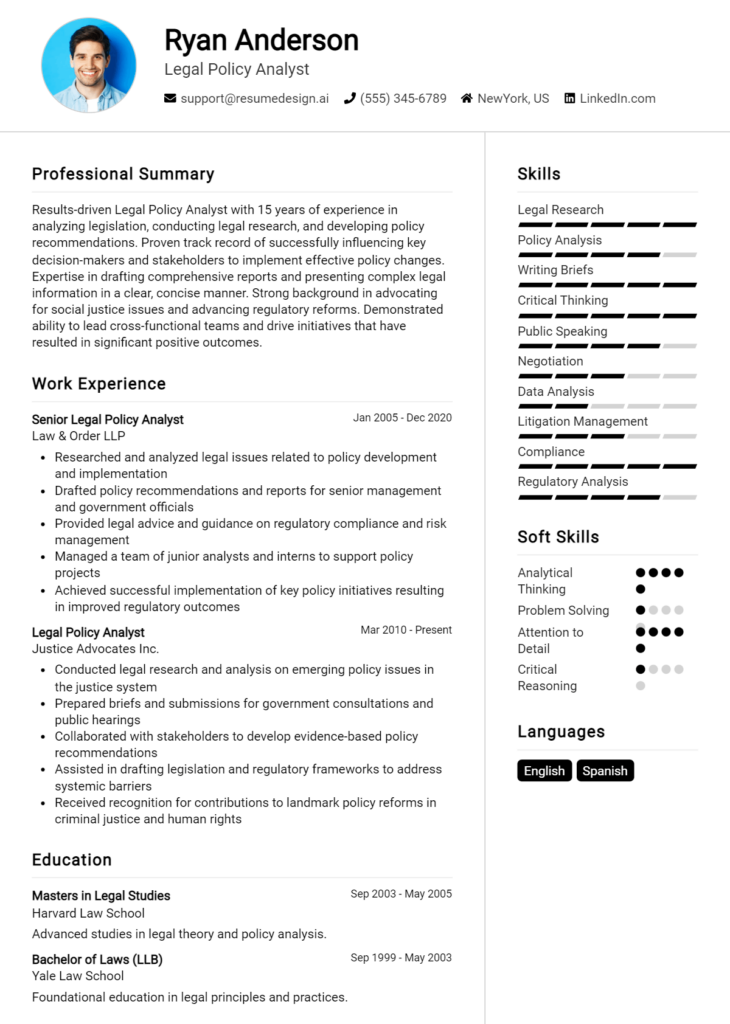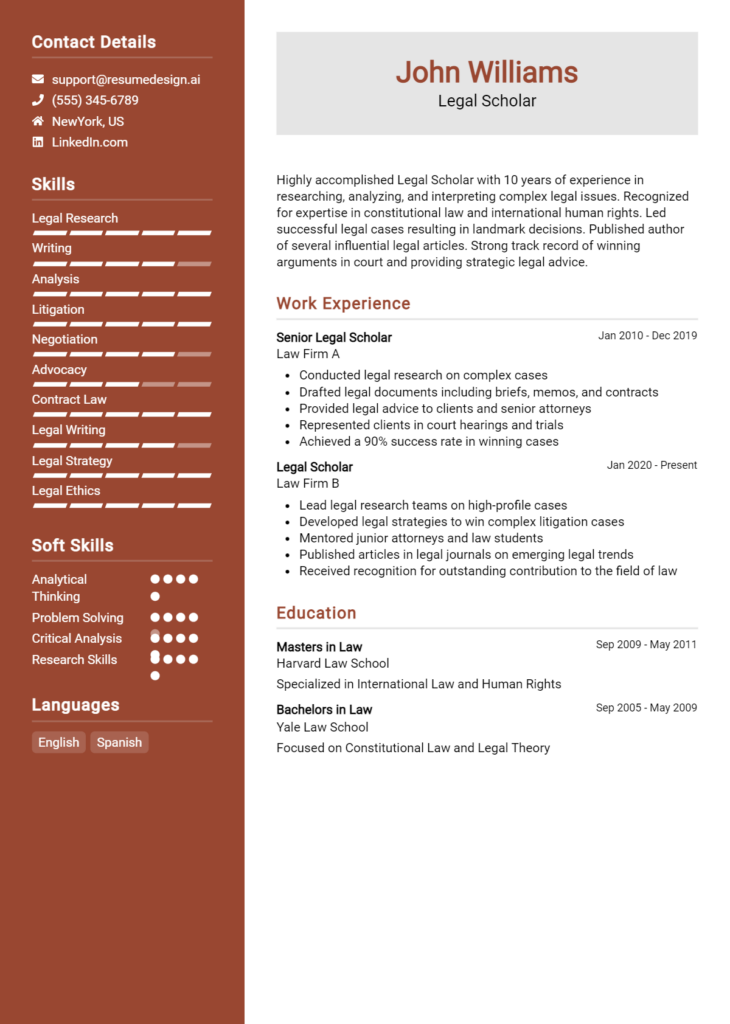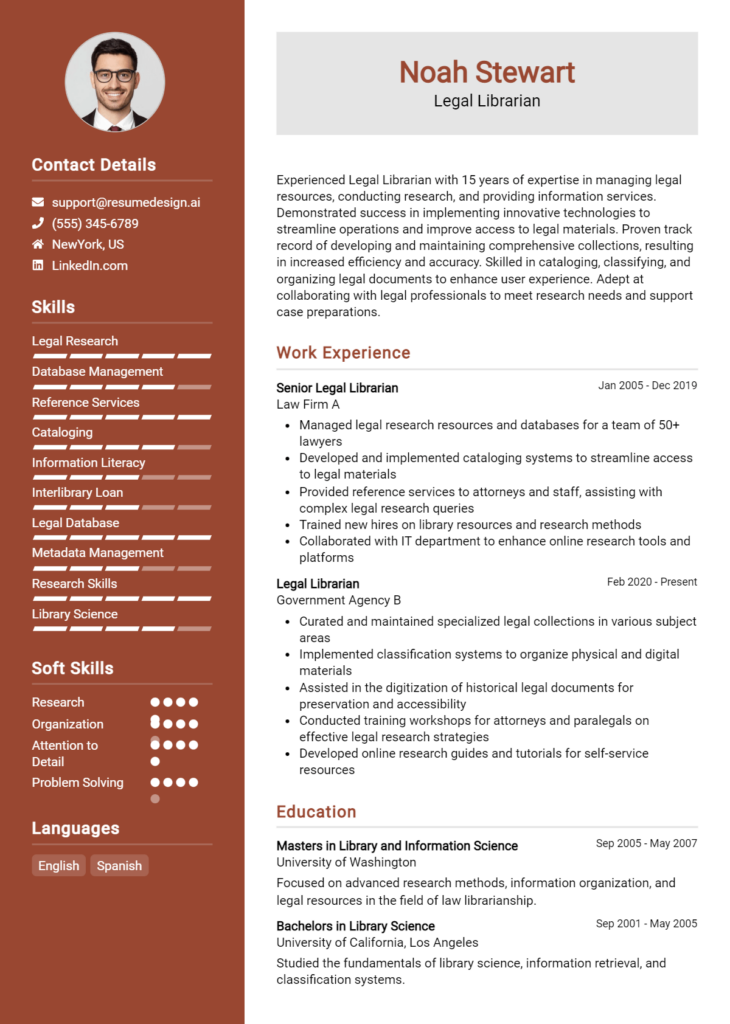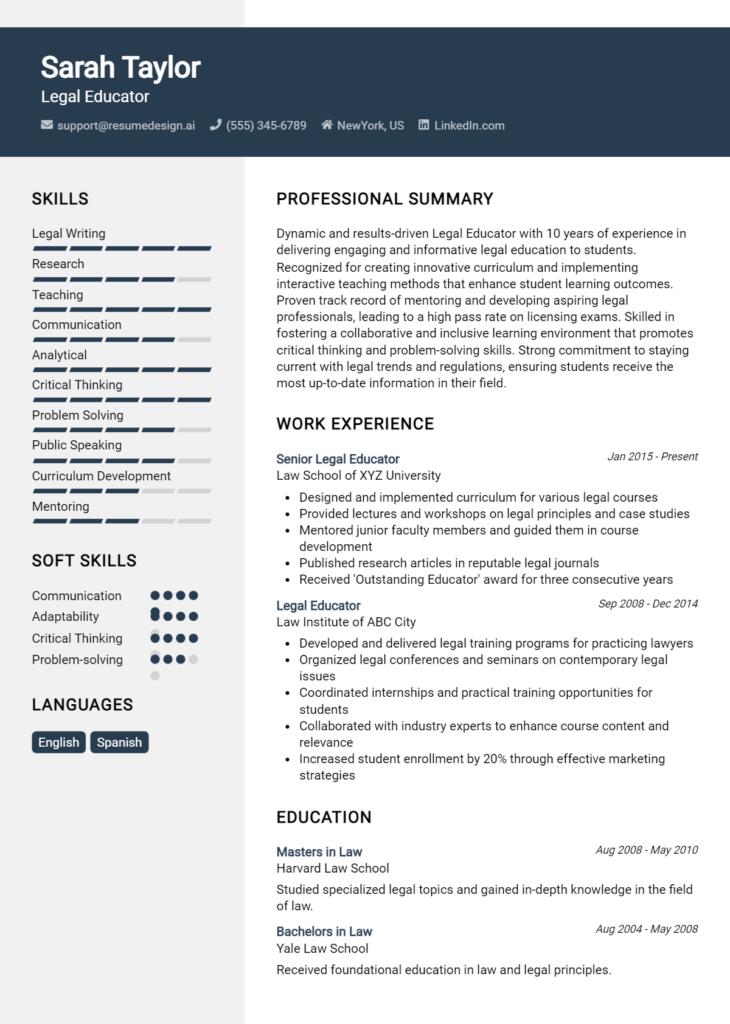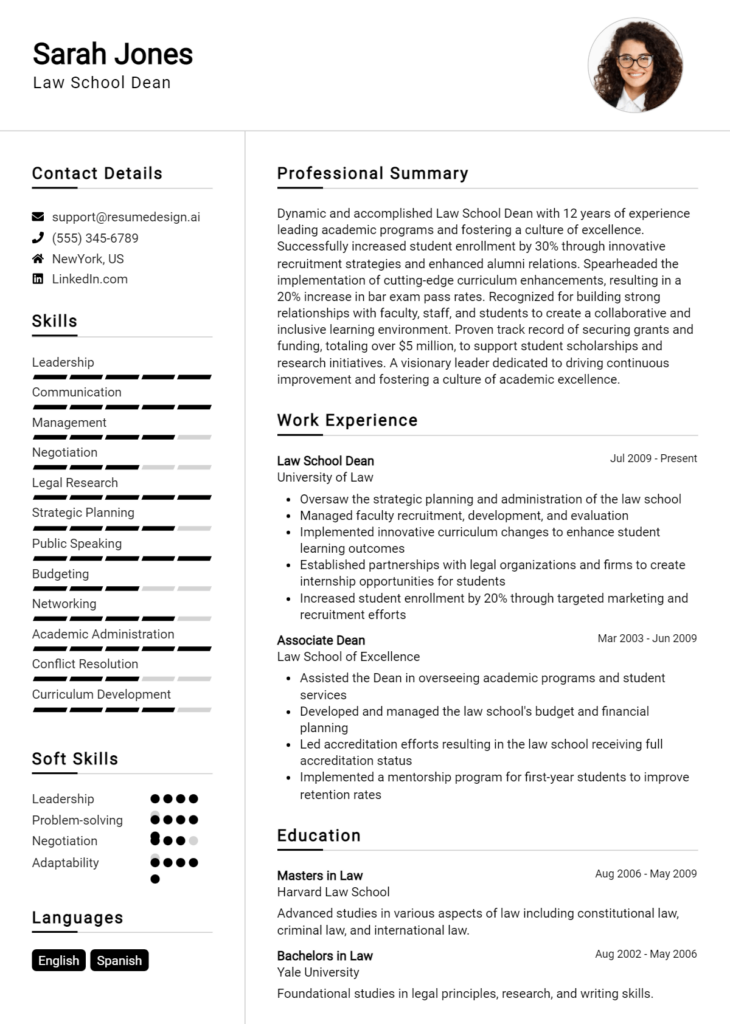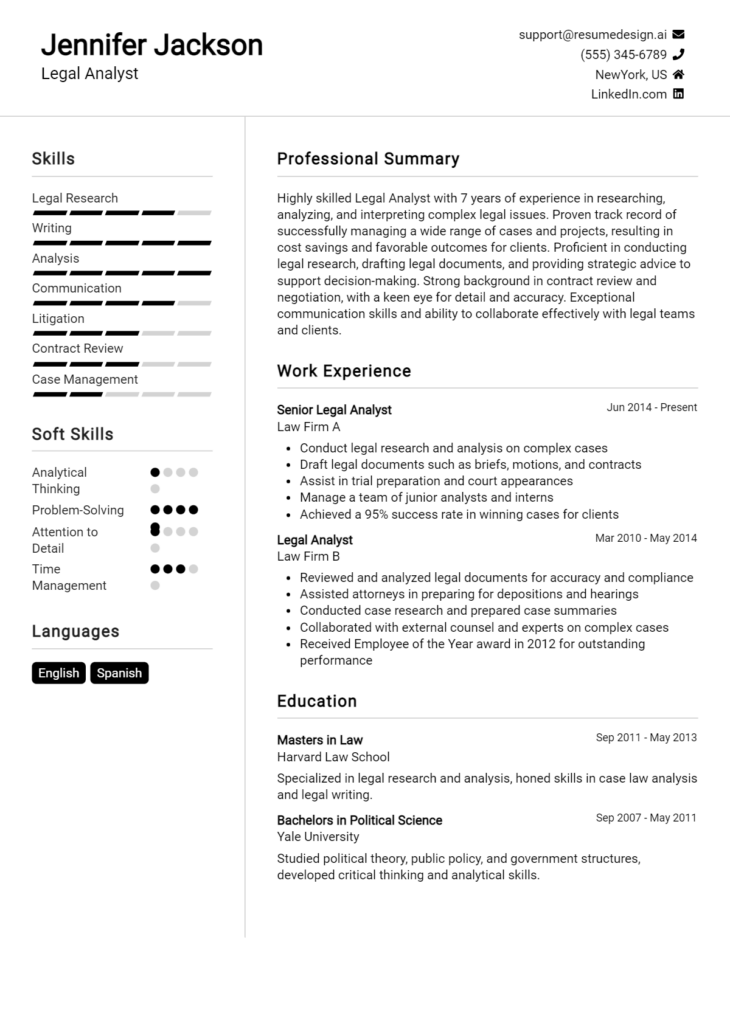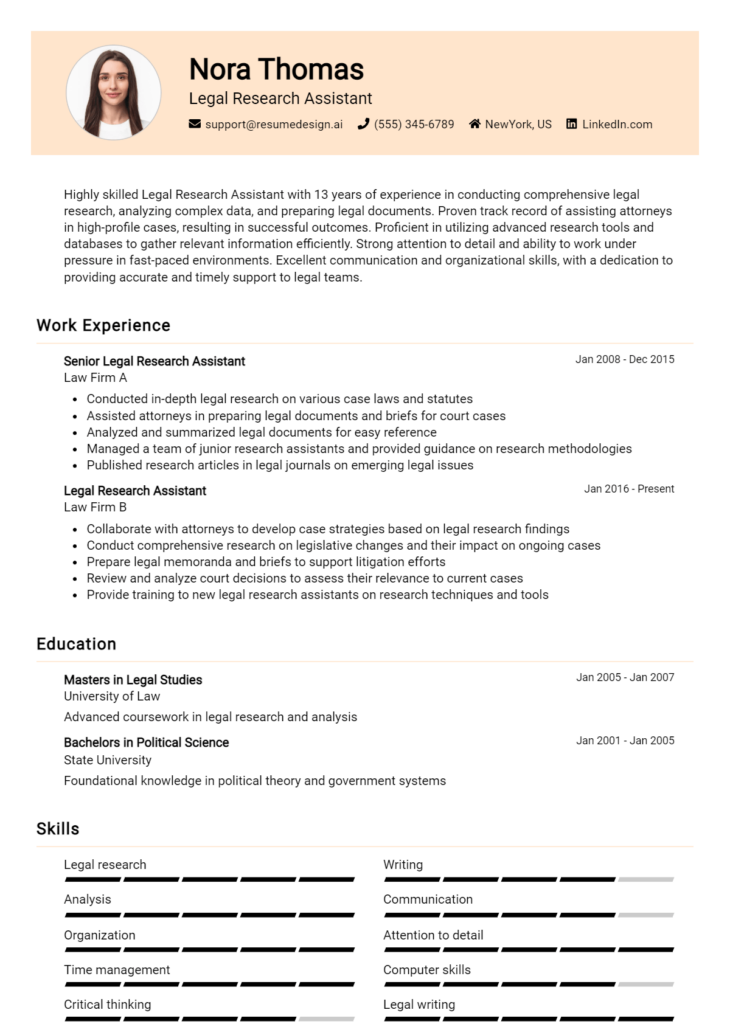Law Professor Core Responsibilities
A Law Professor plays a crucial role in educating and mentoring students while conducting research that bridges various academic departments. Key responsibilities include developing curriculum, delivering lectures, and advising students, necessitating strong technical, operational, and problem-solving skills. These abilities are vital for fostering critical thinking and interdisciplinary collaboration, ultimately contributing to the institution's educational objectives. A well-crafted resume effectively highlights these competencies, showcasing the candidate's value to potential employers.
Common Responsibilities Listed on Law Professor Resume
- Design and implement innovative course curricula.
- Deliver engaging lectures and facilitate class discussions.
- Conduct original legal research and publish findings.
- Advise and mentor students in academic and professional development.
- Participate in departmental and faculty meetings.
- Collaborate with interdisciplinary teams on research projects.
- Provide expert guidance on legal writing and analysis.
- Engage in community outreach and pro bono activities.
- Stay current with legal developments and educational trends.
- Evaluate student performance and provide constructive feedback.
- Contribute to institutional committees and governance.
- Attend and present at academic conferences and workshops.
High-Level Resume Tips for Law Professor Professionals
In the competitive landscape of academia, a well-crafted resume serves as a crucial tool for Law Professor professionals aspiring to secure their ideal position. Often the first impression a candidate makes on a potential employer, the resume must not only reflect a wealth of knowledge and expertise but also effectively showcase relevant skills and notable achievements. In this guide, we will provide practical and actionable resume tips specifically tailored for Law Professor professionals, helping you to stand out in a crowded field and convey your unique qualifications effectively.
Top Resume Tips for Law Professor Professionals
- Tailor your resume to the specific job description by including keywords and phrases that match the requirements listed in the posting.
- Highlight your relevant teaching experience, including courses taught, syllabi developed, and innovative teaching methods employed.
- Quantify your achievements wherever possible, such as the number of students mentored, contributions to curriculum development, or published research papers.
- Include any notable awards or recognitions you have received, such as teaching excellence awards, fellowships, or grants.
- Showcase your industry-specific skills, including legal writing, research methodologies, and familiarity with specialized areas of law.
- Emphasize your participation in academic conferences, workshops, or panels, demonstrating your engagement with the legal academic community.
- Incorporate a section on professional development, detailing any additional training, certifications, or workshops attended that enhance your teaching and legal expertise.
- Utilize a clear and professional format, ensuring your resume is easy to read and visually appealing while maintaining academic standards.
- Consider including a brief statement of your teaching philosophy to give potential employers insight into your approach and dedication to education.
By implementing these tips, you can significantly enhance your resume and increase your chances of landing a position in the Law Professor field. A well-structured and tailored resume not only captures your qualifications but also communicates your passion for legal education, setting you apart from other candidates in this highly competitive arena.
Why Resume Headlines & Titles are Important for Law Professor
When applying for a position as a Law Professor, crafting a compelling resume headline or title is crucial. This single phrase serves as the first impression for hiring managers and can significantly influence their decision to read further. A strong headline encapsulates the candidate's key qualifications and professional identity, providing a snapshot of their expertise in just a few words. It should be concise, relevant, and directly aligned with the academic institution's needs, making it an essential tool for standing out in a competitive job market.
Best Practices for Crafting Resume Headlines for Law Professor
- Keep it concise: Limit your headline to one impactful sentence.
- Be role-specific: Tailor your headline to the specific position you are applying for.
- Highlight key qualifications: Include your most relevant skills or accomplishments.
- Use action-oriented language: Start with strong verbs to convey your expertise.
- Avoid jargon: Make sure your headline is easily understandable to a wide audience.
- Incorporate keywords: Use terms from the job description to increase relevance.
- Showcase your uniqueness: Highlight what sets you apart from other candidates.
- Align with institutional values: Reflect the mission and values of the academic institution in your headline.
Example Resume Headlines for Law Professor
Strong Resume Headlines
Innovative Law Scholar with 10 Years of Experience in Constitutional Law
Experienced Legal Educator Specializing in Criminal Justice Reform
Tenured Law Professor and Author with a Focus on International Human Rights
Weak Resume Headlines
Law Professor Looking for Opportunities
Education and Experience in Law
The strong resume headlines are effective because they are specific, highlight relevant expertise, and immediately convey the candidate's qualifications and areas of specialization. They create a strong first impression that engages hiring managers and encourages them to learn more about the candidate. In contrast, the weak headlines fail to make an impact due to their vagueness and lack of specificity, making it difficult for hiring managers to grasp the candidate's unique qualifications or professional identity at a glance.
Writing an Exceptional Law Professor Resume Summary
A well-crafted resume summary is a critical component for any Law Professor looking to make a strong impression on hiring managers. This concise opening statement serves as a snapshot of the candidate's qualifications, quickly capturing attention by highlighting key skills, relevant experience, and notable accomplishments. A strong summary not only reflects the candidate's expertise in legal education and research but also aligns with the specific requirements of the position they are applying for. By being impactful and tailored, the resume summary can effectively set the tone for the rest of the application, making it a crucial element in the competitive academic job market.
Best Practices for Writing a Law Professor Resume Summary
- Quantify achievements to demonstrate impact, such as published articles or successful research grants.
- Focus on key skills relevant to the law professor role, including teaching methodologies and legal research expertise.
- Tailor the summary to the specific job description, using keywords and phrases that align with the institution's needs.
- Highlight unique qualifications, such as areas of specialization or innovative teaching techniques.
- Keep it concise; aim for 3-5 impactful sentences that summarize your strengths.
- Showcase teaching and mentoring experience, emphasizing student engagement and success.
- Include any relevant professional affiliations or honors that bolster your candidacy.
- Use active language and strong verbs to convey confidence and authority in your field.
Example Law Professor Resume Summaries
Strong Resume Summaries
Dynamic Law Professor with over 10 years of experience in teaching contract law, recognized for enhancing student performance by 30% through innovative curriculum design and active learning methodologies. Published in leading legal journals, contributing to scholarly discourse on intellectual property rights.
Accomplished legal educator with a proven track record of securing $500,000 in research grants, specializing in environmental law and policy. Adept at mentoring diverse student groups and developing inclusive classroom environments that foster critical thinking and engagement.
Experienced Law Professor with expertise in criminal law and ethics, having published over 15 peer-reviewed articles. Instrumental in developing a new online course that increased enrollment by 40%, showcasing adaptability to modern educational demands.
Weak Resume Summaries
Law Professor with teaching experience looking for a position at a reputable law school.
Dedicated legal educator with a strong background in various law subjects, seeking to contribute to an academic institution.
The examples provided demonstrate a clear distinction between strong and weak resume summaries. Strong summaries effectively quantify achievements, specify relevant skills, and directly relate to the law professor role, creating a compelling narrative that showcases the candidate's qualifications. In contrast, weak summaries lack detail, contain vague statements, and fail to present any measurable outcomes or unique aspects of the candidate's experience, making them less appealing to hiring managers.
Work Experience Section for Law Professor Resume
The work experience section of a Law Professor resume is critical as it offers a platform to demonstrate the candidate's technical skills, leadership abilities, and commitment to delivering high-quality educational outcomes. This section not only showcases relevant legal experience and academic achievements but also emphasizes the candidate’s capacity to manage teams, mentor students, and contribute meaningfully to the academic community. Quantifying achievements—such as the number of courses developed, student success rates, or research contributions—while aligning the experience with industry standards is essential in presenting a compelling case to hiring committees.
Best Practices for Law Professor Work Experience
- Highlight relevant legal practice experience, including specialties that align with your teaching focus.
- Quantify achievements to demonstrate impact, such as student pass rates or successful grant applications.
- Include leadership roles in academic committees or professional organizations to showcase management skills.
- Emphasize collaborative projects with colleagues, including co-authored publications or joint research initiatives.
- Detail curriculum development efforts, including innovative teaching methods or course redesigns.
- Describe mentorship roles and their outcomes, showcasing your commitment to student development.
- Incorporate any relevant industry certifications or advanced training that bolster your technical expertise.
- Use action verbs to convey your contributions effectively, making your experiences more engaging.
Example Work Experiences for Law Professor
Strong Experiences
- Developed and implemented a new curriculum for the International Law course, resulting in a 30% increase in student enrollment and a 95% satisfaction rating.
- Led a research team that secured a $200,000 grant for a project on Environmental Justice, resulting in three published articles in peer-reviewed journals.
- Successfully mentored 15 students in moot court competitions, with 5 winning national titles over three consecutive years.
- Served as Chair of the Faculty Committee on Curriculum Development, facilitating a comprehensive review that improved course offerings by 40%.
Weak Experiences
- Worked on various projects related to law and education.
- Assisted in teaching courses and helped students.
- Participated in committee meetings regarding curriculum changes.
- Conducted research in different legal areas.
The examples categorized as strong are effective because they clearly articulate quantifiable outcomes and specific contributions that demonstrate leadership and collaboration. They provide measurable impacts that show how the candidate has positively influenced their academic environment. In contrast, the weak examples lack specificity and fail to convey any significant achievements or technical expertise, making them less impactful in showcasing the candidate's qualifications.
Education and Certifications Section for Law Professor Resume
The Education and Certifications section of a Law Professor's resume is crucial as it serves to showcase the candidate's academic achievements, relevant qualifications, and commitment to continuous professional development. This section not only highlights the depth of knowledge acquired through formal education but also emphasizes specialized training and industry-recognized certifications that align with the demands of legal academia. By providing relevant coursework and certifications, candidates can enhance their credibility, demonstrate their expertise, and illustrate their dedication to staying informed about evolving legal practices and education methodologies.
Best Practices for Law Professor Education and Certifications
- Include only relevant degrees and certifications that pertain to legal education.
- List your most advanced degrees first, such as a J.D., LL.M., or Ph.D. in law.
- Provide details about specialized training or certifications related to specific areas of law.
- Highlight any honors or distinctions received during your academic journey.
- Keep descriptions concise but informative, focusing on the significance of each credential.
- Ensure that all qualifications are up-to-date and reflect current legal standards.
- Consider including relevant continuing education courses to showcase ongoing learning.
- Format the section clearly to improve readability, using bullet points for easy scanning.
Example Education and Certifications for Law Professor
Strong Examples
- Juris Doctor (J.D.), Harvard Law School, 2010 - Concentration in Constitutional Law
- Master of Laws (LL.M.), Yale Law School, 2012 - Specialization in International Human Rights
- Certified Professional in Legal Education (CPLE), Association of American Law Schools, 2021
- Courses in Legal Pedagogy and Curriculum Development, University of Chicago, 2019
Weak Examples
- Bachelor of Arts in History, State University, 2000 - Not directly relevant to legal education
- Certificate in Basic Computer Skills, Community College, 2015 - Outdated and irrelevant
- Diploma in Paralegal Studies, Online Institution, 2008 - Lacks recognition in legal academia
- High School Diploma, Local High School, 1995 - Common knowledge and unnecessary for a professorial role
The strong examples are considered effective because they directly relate to the qualifications and skills necessary for a Law Professor, demonstrating advanced legal knowledge and specialized training. They showcase the candidate's commitment to legal education and continuous professional development, which is essential in academia. Conversely, the weak examples lack relevance and do not demonstrate advanced qualifications or specialized knowledge that would benefit the role of a Law Professor. They include outdated or unnecessary credentials that do not align with the expectations of legal academia.
Top Skills & Keywords for Law Professor Resume
As a Law Professor, possessing a diverse range of skills is crucial for effectively educating and inspiring the next generation of lawyers. A well-crafted resume that highlights both hard and soft skills can set a candidate apart in a competitive academic job market. Hard skills demonstrate your expertise in legal principles, research capabilities, and teaching methodologies, while soft skills reflect your ability to communicate, collaborate, and engage with students and faculty. A balanced emphasis on both skill sets not only showcases your qualifications but also signals to hiring committees that you are equipped to contribute to the academic community and foster a positive learning environment.
Top Hard & Soft Skills for Law Professor
Hard Skills
- Legal research and writing
- Curriculum development
- Case analysis
- Knowledge of legal theory and practice
- Public speaking and presentation skills
- Knowledge of legal ethics
- Familiarity with alternative dispute resolution (ADR)
- Proficiency in legal databases (e.g., Westlaw, LexisNexis)
- Assessment and evaluation methods
- Knowledge of academic publishing
- Understanding of intellectual property law
- Grant writing
- Familiarity with educational technology
- Conflict resolution
- Ability to design online courses
- Familiarity with international law
- Knowledge of constitutional law
Soft Skills
- Strong communication skills
- Effective mentorship abilities
- Critical thinking and analytical skills
- Empathy and emotional intelligence
- Adaptability and flexibility
- Leadership and teamwork
- Organizational skills
- Time management
- Networking and relationship-building
- Conflict management
- Problem-solving skills
- Cultural competency
- Creativity in teaching methods
- Patience and understanding
- Ability to inspire and motivate students
- Negotiation skills
- Active listening
- Professionalism and integrity
For more details on essential skills and how to effectively showcase your work experience, consider exploring additional resources to refine your resume.
Stand Out with a Winning Law Professor Cover Letter
Dear [Hiring Committee/Specific Person's Name],
I am writing to express my enthusiastic interest in the Law Professor position at [University/College Name], as advertised on [where you found the job posting]. With a robust academic background in [specific area of law], coupled with over [number] years of teaching experience at [previous institution], I am excited about the opportunity to contribute to your esteemed faculty and inspire the next generation of legal professionals.
Throughout my career, I have dedicated myself to fostering an engaging and inclusive learning environment. My teaching philosophy centers on promoting critical thinking and practical application of legal principles. I have successfully developed and implemented innovative course materials that encourage students to explore the complexities of law, while also emphasizing the importance of ethics and social responsibility. My commitment to mentorship has also enabled me to guide students through their academic journeys, helping them to achieve both personal and professional growth.
In addition to my teaching experience, I have actively engaged in research that addresses contemporary legal issues, particularly in [specific area of research]. My published work in [relevant journals or publications] has not only contributed to academic discourse but has also been utilized in policy discussions, showcasing my dedication to bridging the gap between theory and practice. I am eager to bring this research perspective into the classroom, allowing students to grasp the real-world implications of the laws we study.
I am particularly drawn to [University/College Name] because of its commitment to [specific values or programs of the institution], and I am excited about the possibility of collaborating with esteemed colleagues and contributing to the vibrant academic community. I look forward to the opportunity to discuss how my teaching methodologies, research interests, and passion for law can align with the goals of your institution. Thank you for considering my application.
Sincerely,
[Your Name]
[Your Contact Information]
Common Mistakes to Avoid in a Law Professor Resume
When crafting a resume for a law professor position, it's essential to present a polished and professional document that effectively showcases your qualifications and experiences. However, many candidates make common mistakes that can hinder their chances of standing out in a competitive field. Avoiding these pitfalls will help ensure that your resume reflects your expertise and commitment to legal education. Here are some common mistakes to watch out for:
Overly Complex Language: Using jargon or complex legal terminology can make your resume difficult to read. Aim for clarity and conciseness to ensure that your qualifications are easily understood.
Lack of Specificity: Failing to provide specific examples of your teaching experience, research, or publications can leave hiring committees wanting more. Quantify your achievements where possible, such as by stating the number of courses taught or the impact of your research.
Ignoring Formatting: A cluttered or inconsistent format can distract from your content. Use a clean, professional layout with clear headings and bullet points to enhance readability.
Neglecting Teaching Philosophy: Omitting a brief statement about your teaching philosophy may give the impression that you haven't reflected on your pedagogical approach. Including this can provide insight into your commitment to education.
Inadequate Focus on Research: Law professors are often expected to engage in research, so failing to highlight relevant publications or ongoing projects can be a significant oversight. Be sure to include details about your research interests and contributions to the field.
Not Tailoring the Resume: Submitting a generic resume for various positions can lead to missed opportunities. Tailor your resume to each specific law school or position, emphasizing the most relevant experiences and skills.
Forgetting Professional Development: Ignoring to include relevant workshops, conferences, or additional training can make your resume appear stagnant. Continuous professional development is crucial in academia, so highlight your commitment to lifelong learning.
Neglecting Service Contributions: Law schools value faculty who contribute to their communities and institutions. Failing to mention committee work, student mentorship, or community service may underrepresent your commitment to the academic environment.
Conclusion
As we’ve explored the essential qualities and qualifications of a successful Law Professor, it’s clear that a well-crafted resume is paramount in showcasing your expertise and experience. Key points discussed include the importance of academic credentials, teaching experience, research contributions, and active engagement in legal scholarship. Additionally, networking within academic circles and demonstrating a commitment to student success are crucial elements that can set you apart in this competitive field.
Now that you understand what makes a compelling Law Professor resume, it’s time to take action. Review your current resume to ensure it reflects your strengths and aligns with the expectations of hiring committees. To assist you in this process, consider utilizing available resources such as resume templates, which can provide a professional layout, or the resume builder, which simplifies the creation of your document. Additionally, browsing through resume examples can inspire you to present your unique qualifications effectively. Don’t forget to complement your resume with a strong cover letter by exploring cover letter templates that can help you articulate your passion for teaching and the law.
Take the next step in your academic career by ensuring your resume accurately reflects your capabilities and aspirations as a Law Professor.

